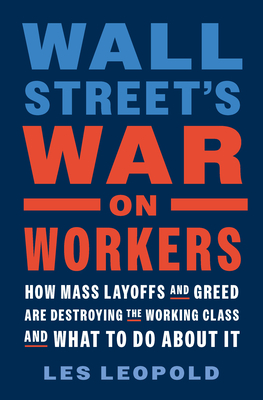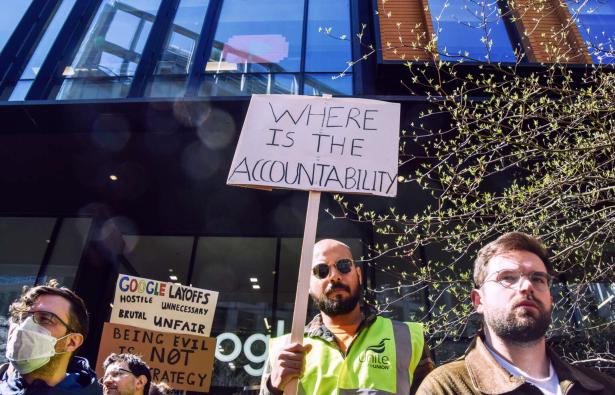books Wall Street’s War on Workers: How Mass Layoffs and Greed Are Destroying the Working Class and What To Do About It
I've been deeply involved in the labor movement for over twenty-five years as an organizer, union leader, and instructor. One principle I've grasped is that education is crucial in mobilizing working people. It's more than just organizational skills; it's about helping workers grasp the economic and political forces shaping their lives. That's exactly what economist and author Les Leopold has dedicated his career to—providing labor organizers and union leaders with the educational foundation for campaigns for economic justice.
In his 2015 book, Runaway Inequality: An Activists Guide To Economic Justice, Leopold exposed the systemic ways vast wealth disparities, political inequities, and skewed government policies were engineered to separate wealth from working people. That didn't just happen. Extractive processes, like stock buybacks and leverage buyouts, which enrich corporate executives and stockholders at the expense of workers, are described in detail and names are named. Leopold's goal is to show that wealth and income inequality isn't just a glitch, but rather the result of choices made to benefit Wall Street and big business, to make them wealthier no matter who else paid the bill.
Wall Street's War on Workers: How Mass Layoffs and Greed Are Destroying the Working Class and What to Do about It
By Les Leopold
Chelsea Green Publishing Company; 240 pages
February 22, 2024
Hardcover: $28.00; E-book: $28.00
ISBN: 9781645022336
ISBN-10: 1645022331

Leopold's new book, "Wall Street's War on Workers: How Mass Layoffs and Greed Are Destroying the Working Class And What to Do About It," offers a closer and more detailed look at how wealth extraction occurs, how workers bear the brunt of it, and how this dynamic challenges our political organizing efforts by labor unions and other progressive change organizations.
Leopold uses government data (Census and BLS, mostly) to show how mass layoffs, as they have become more commonplace since the 1980s, have increased income and wealth inequality and undermined working-class solidarity. He argues that in historically strong Democratic working-class manufacturing communities, mass layoffs coincide with the expansion of stock buybacks, financial deregulation, and deindustrialization. This, coupled with the defection of formerly proud-to-be-union working-class workers, reshaped the political landscape.
The aftermath of mass layoffs is personally devastating, causing familial and community stress, which leads to social conditions conducive to the decline of small-town America. Places that have been devastated by issues like the opioid epidemic, deaths of despair, and increased support for nationalist authoritarianism. The commonly held trope is that the working class is hanging on to its guns and religion, in Barack Obama's infamous phrase, because of their resistance to change. However, Leopold's study of voter attitudes in Blue Wall states challenges the prevailing assumption that white working-class support for right-wing candidates stems from racial anxiety. The public opinion surveys he cites demonstrate that the white working class has, in fact, trended more liberal in the last 20 years on issues of race, gender, and sexual orientation, while simultaneously abandoning the Democratic Party.
The white working class's departure from the Democratic Party, Leopold shows, often reflects frustration with economic insecurity, stagnant wages, and a sense of abandonment by those who once claimed to represent their interests. He argues that the increasingly liberal leanings of many white working-class voters mean that the economic fight against mass layoffs is fertile ground for a robust, inclusive labor movement that fights against economic inequality and authoritarianism.
Leopold's work is indispensable for labor organizing because of his ability to communicate complex ideas in plain language. His narratives, like the plight of coal workers in Mingo, West Virginia, affected by stock buybacks, are direct and clear, yet resonate with a colorful flair that underscores the gravity of his findings. Workers will find it relatable and helpful as they map a strategy to make political change in their communities.
Les Leopold's 'Reversing Runaway Inequality' project was an educational cornerstone for my personal organizing experience, including the Verizon strike in New York City and my union's support for Bernie Sanders in 2016. However, "Wall Street's War on Workers" presents different stakes. Inequality was a problem that we thought would be fixed by building political coalitions across silos, but Leopold's new book shows that inequality is the symptom. The disease is a political system that incentivizes financialization, best demonstrated by a culture of ongoing and repeating mass layoffs. When workers are used without consideration, the system breaks down, and they look for any port in a storm that promises stability. The battle, it turns out, for the labor movement is greater than economic justice; it is the fight for democracy itself. As Leopold notes, you can't fight back against authoritarianism without fighting against mass layoffs!
[Steve Lawton has over 25 years of experience as a rank and file labor organizer and union leader, notably serving as President of CWA Local 1102 for 11 years. Currently, he focuses on labor education and curriculum development for CWA District 1's political program, alongside his role as an Adjunct Instructor at the Harry Van Arsdale JR School of Labor Studies.]


Spread the word